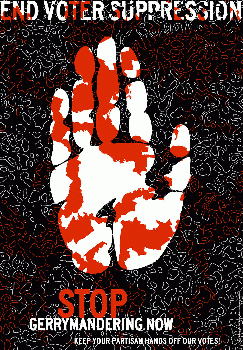From Truthout
The importance of the January 5 Senate runoff elections in Georgia cannot be overestimated. They will determine which party controls the Senate, with vast ramifications for economic policy, climate change, workers' rights, immigrants' rights, judicial nominees, and much more. The purging of nearly 200,000 registered voters from the voting rolls in Georgia could spell the difference between a Republican or a Democratic majority in the Senate.
In October 2019, Georgia Secretary of State Brad Raffensperger purged 313,243 people from the voter rolls, claiming they had moved from their registration residence, which is a ground for removal under the National Voter Registration Act (NVRA). But five top expert firms hired by the Palast Investigative Fund (PIF) determined that 198,351 of those Georgia voters had not moved at all and were therefore illegally purged from the rolls.
Georgia claimed that thousands of voters submitted postal change-of-address forms, but the U.S. Postal Service said they did not. In addition, Georgia allegedly violated the NVRA by employing an unlicensed contractor who used an incorrect list.
The PIF experts performed a name-by-name analysis of the addresses, using Advanced Address List Hygiene. John Lenser, an address hygiene consultant and CEO of American Fifth Act, testified that this is the industry standard for residential address verification. The experts called on more than 240 data sources. They found a 63.3 percent error rate. That doesn't even include tens of thousands of other voters purged for moving within their neighborhoods or apartment buildings, which constitutes a violation of the NVRA.
"Georgia's officials have been exposed using a horrendously inaccurate list of voters whom they claim had filled out postal change-of-address forms," investigative reporter Greg Palast told Truthout. "The Postal Service itself says they did not fill them out. They did not move. Yet, the political hacks that run Georgia's elections have chosen this rotten trick to stop tens of thousands of citizens from voting." The cancellations primarily impact young voters, lower income voters and people of color.
In a prior case, Georgia's secretary of state admitted that voters could be restored to the rolls within 24 to 48 hours if necessary. Why, then, does Raffensperger refuse to reinstate those voters? "It is a cold, racially poisonous game, brazenly backed by the Republican National Committee lawyers desperate to bend the upcoming Senate runoff," Palast said.
The voter registrations were cancelled because, the secretary of state alleged, (1) they had filed a change of address form with the National Change of Address (NCOA) registry; (2) election officials had received returned mail; and (3) Georgia law in effect at the time of the cancellations allowed removal if, after three years of no contact, the voter did not return a confirmation postcard and then did not vote in the next two general elections; this is known as "use it or lose it."
Four civil rights organizations, including Black Voters Matter and Rainbow PUSH Coalition, filed a lawsuit in U.S. District Court for the Northern District of Georgia (Atlanta) on December 2. The suit was based on the expert reporting of PIF and the official report of the ACLU of Georgia that was published on September 1. Those experts determined that 199,908 voters can still receive mail at their address of registration so it is not likely they have moved.
Plaintiffs are asking that the nearly 200,000 names allegedly wrongfully removed from the voter rolls be restored in time for the critical runoff election on January 5. In the alternative, they seek the appointment of a "special master" -- an expert who would review the work of the PIF experts and the secretary of state's list maintenance experts to decide which voters were wrongfully removed from the rolls and reinstate them.
The NVRA, which Congress enacted in 1993, declares that voting is a fundamental right. It requires that federal, state and local governments promote the exercise of the right to vote. And it says:
"Discriminatory and unfair registration laws and procedures can have a direct and damaging effect on voter participation in elections for Federal office and disproportionately harm voter participation by various groups, including racial minorities."
Georgia's "use it or lose it" rule violates the Equal Protection Clause of the 14th Amendment, the lawsuit claims, because it creates incorrect distinctions, thereby disenfranchising infrequent voters.
On December 16, the district court judge denied the plaintiffs' request for an injunction for noncompliance with the NVRA's 90-day notice requirement. But the judge said there were discrepancies and told the parties to sit down and try to settle the case.
On December 28, the plaintiffs filed a motion for reconsideration and a request to add the Palast Investigative Fund as a plaintiff in the case. A letter the plaintiffs' attorney sent to Raffensperger on September 22 on behalf of PIF would then satisfy the 90-day notice period, which expired on December 23.
(Note: You can view every article as one long page if you sign up as an Advocate Member, or higher).






